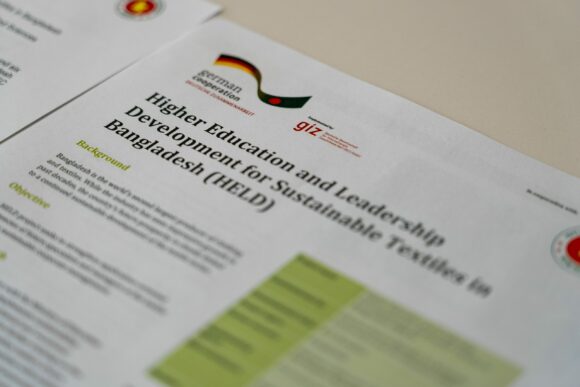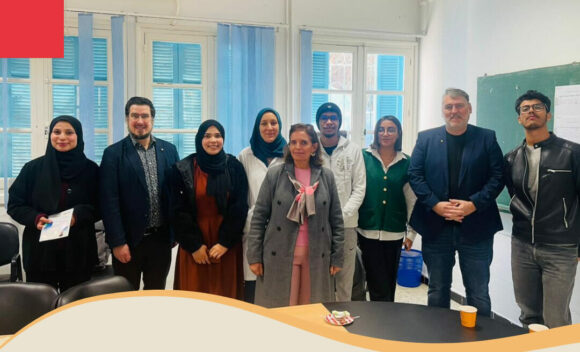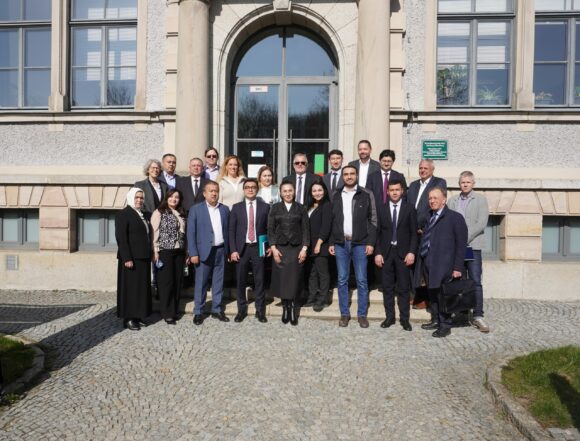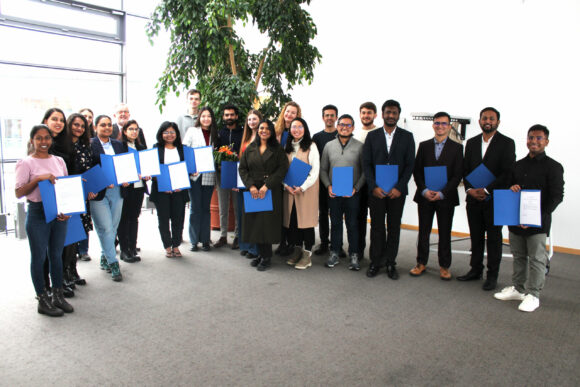Germany and Latin American countries are linked by diverse relationships, and growing cooperation in science has been observed for many years. Hof University of Applied Sciences also wants to focus more on Latin America. To this end, President Lehmann recently undertook a trip to five countries: Paraguay, Panama, Colombia, Mexico and Costa Rica. However, Hof University of Applied Sciences already has two female researchers here on campus, and today we want to talk to both of them about their views: Shantall Cisneros Saldana and Paola Acosta Carrascal both work at research institutes, one in the field of Industry 4.0 and the other in the field of water management.

As an introduction, please tell us what and where you studied?
Shantall: “I completed a degree in oil and gas engineering in Bolivia, after which I worked as a project engineer in a company and then came to Germany. I then studied for a Master’s in Operational Excellence in Hof.”
Paola: “I studied environmental engineering in Colombia and then worked in a foundation there.”
Were the study cities in Colombia and Bolivia larger or smaller cities?
Shantall: “I come from La Paz and then completed part of my studies in Cochabamba. With around 900,000 inhabitants, the city of La Paz is much larger than Hof and Cochabamba, with around 600,000 inhabitants, is slightly smaller than La Paz. I was surprised that the stores in Hof close very early and are not even open at the weekend. However, the biggest difference for me is not the city itself, but the nature around it. You can go hiking here in Upper Franconia, which I discovered for myself.”
Paola: “In Colombia, there are Medellin and Bogotá, cities with millions of inhabitants. I come from Cúcuta on the border with Venezuela, which has around 800,000 inhabitants, and I studied in Bucaramanga, which has around 600,000 inhabitants. So far, I’ve always taken the bus and train, but I actually like walking. In Hof, I often walk to the university and take the bus back. I’ve actually just bought an eBike, which I’ll be using soon. It makes up for the ups and downs in the city.”
And how did you end up in Germany?
Shantall: “I’m married to a German and at some point we asked ourselves whether we wanted to live in Bolivia, Germany or a quasi-neutral country. At some point, we decided on Germany. And then there were interesting jobs in the Hof region, which is why we are here.”
Paola: “I wanted to pursue the topics from my first degree and my work: Air quality, pollution, etc. I was looking for such a Master’s degree and ended up at the University of Stuttgart, where I completed the WASTE course with a Master’s degree in Environmental Engineering. The fact that I was able to get a scholarship from the Colombian government and that my sister was in Switzerland also spoke in favor of Stuttgart, so we were able to visit each other.”

What exactly is your role in research now? What are you researching?
Paola: “Here in Hof, I’ve worked on three research projects, spread across two research institutes. My focus is still on water and wastewater. The project I’m currently working on is about removing trace substances such as pharmaceutical residues in wastewater. The processes are then to be used in smaller wastewater treatment plants, which is why we have three companies and a city involved.“
Shantall: “My focus is on topics related to Industry 4.0. My tasks include data analysis, project management and the development of concepts that help companies with the transition to Industry 4.0, such as the design of an intelligent assembly line. We also have several interesting projects in collaboration with international companies, such as the collaboration with a company from India, which is about innovation in the supply chain.”
Which funding program are you funded by?
Paola: “First I was funded by two projects from the Federal Ministry of Education and Research (BMBF), now I am funded by a project from the German Federal Environmental Foundation (DBU).”
Shantall: “In my case, it’s more like contract research, i.e. companies have commissioned us to do research for them. Our positions are temporary, so we have to see what happens afterwards. The BMBF is currently issuing a call for proposals for collaborations with Latin America, and Paola and I are each taking part in a project. We think it’s positive that we can help choose which calls we take part in.”

You are always out and about in the Hof University canteen and cafeteria. How do you like them?
Shantall: “As we don’t have that many working hours at the moment, we just go and eat together in the canteen from time to time. We always meet other colleagues there, for example the two other Latin American employees at the university. My favorite thing in the cafeteria is the falafel sandwich, which is almost always available.”
Paola: “I definitely prefer the chocolate cake!”
What are the next steps for you professionally? Will you stay in research or would you prefer industry? Germany or back home?
Shantall: “I would like to spend a few more years working on innovative solutions in research. Germany has become my second home and I will stay here with my husband and my Bolivian dog. As I now have both nationalities, that’s not critical either.”
Paola: “I always wanted to be a researcher, so this suits me very well now. That’s also the reason why I’m starting to think about doing a doctorate. I’d like to stay here for another five years, then we’ll see.”
Do you have any anecdotes when you think about your work here?
Paola: “I had – and actually still have – difficulties with the local greeting habits: “Grüß Gott” or “Mahlzeit”. With the latter, I thought my colleagues were telling me that it was time to eat, but later I realized that it was a greeting at lunchtime. I still struggle with “Grüß Gott”, I feel like it’s not a natural greeting.”
Shantall: “I didn’t even know about scheduling with “calendar weeks”. I first had to change my cell phone so that I knew what people were talking about.”
What else have you noticed?
Shantall: “Since my dog – his name is Bruce – has been in Germany, I’ve noticed that there are a lot of pet-friendly places, not just in restaurants and hotels, but also places where we can take him for walks and he can play with other dogs. for example, we even went hiking with other colleagues and took Bruce with us, he loved it.”
Paola: “I’ve noticed that the nature in Upper Franconia is always more of the same, the differences in altitude are not so great. In Colombia, there are different climate zones and so there are tropical and temperate tropical climates, in the mountain regions it is more alpine and also much colder. However, I have the feeling that I find it easier to enjoy nature here. We regularly go for walks in the countryside with Bruce.”
What advice would you give the new generation of researchers when they come to Germany?
Paola: “I think you should start learning German in advance, it makes a lot of things easier. This also applies if the Master’s degree is in English. We recommend the Goethe-Institut or the Instituto Cultural Colombo Alemán, for example. You should also check whether you can find a scholarship for yourself, it’s usually not that difficult.”
Learning German in Colombia
- Goethe-Institut
- Instituto Cultural Colombo Alemán
- Alexander von Humboldt
- Casa Cultural Colombo Alemana de Cartagena
- Fundación Colombo-Alemana
- Centro Cultural Colombo Alemán de Cali.
Learning German in Bolivia
- Goethe Institute
- Instituto Cultural Boliviano Alemán
- Centro de Idiomal UCB
“I started learning German at the Goethe-Institut in Bolivia and then continued learning in Germany. I think that’s important too, even for basic things like shopping. For example, I remember a situation in a grocery store and it was all about payback points – I didn’t understand what the lady wanted from me! And then there was a very long discussion.
Shantall
It’s also important not to be afraid of the new culture, you shouldn’t remain static. My tip: get out of your comfort zone!”
Thank you for the interview!
The interview was conducted by Anne-Christine Habbel







